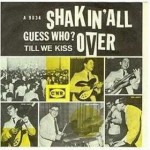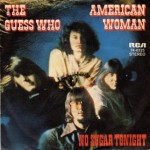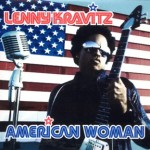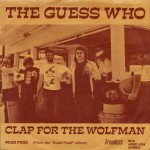The Guess Who had a truly impressive number of hit songs during the late 1960’s and early 1970’s, including “These Eyes”, “Laughing”, “Undun”, “No Time”, “American Woman”, “No Sugar Tonight”, “Share the Land”, and “Clap for the Wolfman”, many of which are on regular rotation on today’s classic rock radio.
Drummer Garry Peterson was a founding member of The Guess Who, and was part of their classic late 1960’s and early 1970’s line-up. He and founding bassist Jim Kale are in the current incarnation of the band.
This interview was done by phone on 2/21/13 for a preview article for The Guess Who’s concert at the Chumash Casino on 3/14/13. (Wayne Drennar photo)
Jeff Moehlis: What can we look forward to at your upcoming show?
Garry Peterson: In this era that we’re in right now, it’s mostly polkas.
JM: [laughs]
GP: You have to imagine that almost every interview asks that. I think that our fans, or people that come to see The Guess Who, would be very angry if we didn’t play all of the hits that they know and love. So what we will do is play all the songs that were Top 40 hits, probably. I think there’s about fourteen or fifteen, or something like that. Plus we will play a song that we re-recorded by Little Richard, we will play that. And we will probably play two new songs that we recorded in the past year.
JM: It’s an interesting story how the band first got its name. Could you tell me about that?

GP: We were signed to a Canadian record label called Quality Records, and when we recorded our 1965 single “Shakin’ All Over”, Sceptor Records in New York City leased that record from Quality, and wanted to put it out on Sceptor. And they did. Because the world was playing British Invasion music, George Struth, who was the president of Quality Records, thought we may have a hard time getting it played on American radio because it was a Canadian group. So they put on the label “Guess Who?”
People calling in for the record to be played again would say “We want that record ‘Shakin’ All Over’. Is that The Animals or The Beatles, or somebody under a pseudo-name?” I think what happened is finally the disc jockeys and the people phoning in would say, “Let’s listen to the song by The Guess Who.” They put the article in front of it. And after that point we were going to release our next record under the name that we had at that time, which was Chad Allen and the Expressions. But since we were already branded with that name, it was useless and futile.
It was really a promotional gimmick that turned into the name. We weren’t quite happy with it, because we didn’t want to be accused of plagiarism with The Who out there. But that’s the way it happened, so we became The Guess Who.
JM: You had some luck with “Shakin’ All Over”, but did you ever consider relocating to the U.S. in search of success, which some other Canadian musicians did?
GP: Yeah, I think there was that in the back of our minds, but being local guys from Winnipeg, it was kind of safer, just in case we weren’t able to… At the time of “Shakin’ All Over”, we’ve got guys in college and with other jobs. Canada’s always been in the shadow of the United States, more conservative in nature. And that was our upbringing.
In retrospect it would’ve been interesting to see, had we moved to California like Neil Young did. He was from Winnipeg. He grew up with us. He moved to L.A. and the San Francisco area. So, it’d be interesting to know what would’ve happened to our band had we done that. But we didn’t. We stayed at home. And that was a harder way, really, to make it. Because we weren’t hanging out with all the big people in the industry.

JM: Looking at the band’s past catalog, it’s amazing how many songs are well-known. My favorite of the bunch is “American Woman”. How did that particular song come together?
GP: We were playing in Toronto after a long tour of the United States, with the unrest that was in this country during that time period with the racial problems and other things, and the war in Vietnam. Coming from Winnipeg, this was all new to us. We didn’t have those kind of problems there. So it was kind of an eye opener.
One night we were just outside of Toronto, and we had two one-hour sets. In between sets we took a break and were out talking with our producer Jack Richardson and some other people from RCA Records in Canada that were at the show. We couldn’t find Burton Cummings, our lead singer, for the second set, so we just went on and I started playing this rhythm, with a double bass drum figure. Because I was listening to Buddy Miles at the time, and he was playing with a double bass drum set in The Electric Flag. If you listen to their album you’ll get a feeling for what his drumming was like, and how “American Woman” kind of comes from that.
We started playing, Randy [Bachman] started playing some riff, and I guess Burton heard that and came running onstage, because he knew that he was late [laughs]. It was basically a jam, that it started as. The audience really enjoyed it, so we said, well, we have to keep that in the show. And it kind of morphed every night, and changed – we threw this out, put that in, you know. Finally, after playing it onstage, which is a great way to develop a song because you’re playing it for the people and they’ll tell you if they like it or not, then we went to Chicago, RCA Mid-America Recording Studio and cut the song. Basically it was a group effort jam onstage.
And the only Number One song we had. Oh, I shouldn’t say that, because it was a double-sided Number One hit, in other words the A-Side of the 45 and the B-Side [“No Sugar Tonight”] both charted Number One at the same time. There are only three or four other acts that have done that, ever. That would be Elvis, The Beatles, The Rolling Stones, and The Guess Who.
JM: Good company [laughs].

GP: I’m not meaning to say that we’re in that category, just in this one instance. I think it’s a great honor to have achieved that. Lenny Kravitz re-recorded it in ’99 or 2000. I think he had a Number One hit with it [JM: It charted, but did not hit Number One]. It would be interesting to look up how many songs have made it to the Number One slot twice, by different artists.
JM: Around that time period you performed at the White House, for Richard Nixon and Prince Charles.
GP: It was post-“American Woman” because Randy Bachman was out of the band by that time.
JM: What was that experience like?
GP: We actually played the south lawn of the White House. They set up a gazebo with the Marine Corps Band at one end, and Gary Puckett from Gary Puckett and the Union Gap performed with them. We were set up at the other end of the gazebo. I think that gazebo cost about $100,000 dollars to build at the time. That was during Nixon’s second term, I believe. He was entertaining the British Ambassador and Princess, and then Prince Charles, and David Eisenhower and Tricia Nixon Eisenhower. Actually I’m looking at a picture on the White House lawn with all of us with all of those people. Not Nixon, but the kids. Prince Charles, Princess Anne, and David Eisenhower and Tricia Nixon Eisenhower. It’s signed by the two Nixons. I’m looking at that right now – funny you should mention it.
JM: Did you interact with President Nixon at all?
GP: They had their dinner inside the White House with the royalty. Probably the reason they had us was that Canada was part of the British Commonwealth, as a gesture to the visiting British monarchs. The people on the lawn outside were the sons and daughters of the biggest contributors to Richard Nixon’s second campaign.
For instance, my wife at the time was sitting at a table, and while we were playing she said she was asked to dance by this young gentleman. She got up and said to him, “How is it you happen to be at this party? How did you get the invitation?” The young man said, “Well, my father was probably one of the biggest contributors to President Nixon’s campaign.” And my wife said, “What is your name?” And he said, “My name is David Lear.” That would be Learjets. I guess that’s the kind of people.
We had at our table the daughter of one of the Senators at the time, I don’t know who it was. It was actually for the kids outside.

JM: There were a couple of years were things really came together for the band, ’69, ’70, with a bunch of hits. What was that time like for you? Was it crazy busy, or did you have time to enjoy the success?
GP: Yeah, it was busy. I mean, we were very young then, so your energy level is much different than mine is now at 67 years old. For me personally, I know some of the guys were getting burned out, but that’s because you can’t burn the candle at both ends and be on tour. Doesn’t work. And we have a lot of dead people because of that in the industry, and we have a lot of burnt out people. You have to be disciplined enough to say, hey, is it more important to stay up all night and drink and do drugs, or is it more important to be onstage and play music?
Well, for me personally, it was more important to be onstage and play music and entertain people. But then again, my profession musician career starts in 1949 when I’m four years old. I had a tradition of show business in my life and my blood long before The Guess Who were even thought about. So for me it was different. My attitude would be, yeah, it’s like any other job. You know, you have to work when you work, and play when you play. But you have to put everything in balance and in perspective.
So for me, this is what we wanted. This is what we dreamed about. I’m looking at a picture here on my wall of Dick Clark on the American Bandstand set, with the big logo on the curtains behind us – it’s a very young Dick Clark – and he’s handing us our first Gold Record. That’s what we wanted to do, you know? You don’t just automatically get teleported like Star Trek, you have to work your way there. And that’s exactly what we did.
I mean, you dream about it happening. But for myself, I don’t know if I ever thought it would happen. We worked and we worked, and we invested and we re-invested, and we recorded and we re-recorded. We were with six record labels, and then one day you wake up and Dick Clark is handing you a Gold Record. In some sense it just seems like it’s a dream, or it just happened automatically, but when you look at it in hindsight you see all the work that it took to get there, and not only the work but the luck involved. Because there’s a ton of talent out there at all times. And the timing of who you meet, and who says “Hey, we want these guys. We’re going to do something with them.”
It’s kind of like a football team. You can’t make it on yourself, the formula is music, band, record company, fans, radio, press. And without any one of those you don’t have the equation. I mean, that’s the way I look at our era. Music today is a bit different. But there’s still some similarity, you need elements to create a successful act.
JM: What is your take on why Randy Bachman and Burton Cummings left the band?
GP: I don’t know, you’d have to ask them really why they did. But I think it’s been written in print. Randy was actually asked to leave the band in New York City when we met him there. It’s a long story which takes a long time to explain, but basically he was in New York City while we were out on the road with a substitute for him because he was supposed to be sick at home. And he was doing a record deal for a band in Winnepeg.
When we found out we were quite annoyed. We went there, went to his room, waited in the hotel until he came back from the record company, went up there to his room and we said, “Well, Randy, we want you to leave the band.” And he said, “Well guys, I want to quit the band.” So you have to decide which came first, the chicken or the egg. Is it really relevant? It’s sad, that’s what it is, in my mind.
Burton in 1975, I don’t know, I have my private thoughts on why it happened. But he said he’d had enough of this, and he wanted to go out on his own. If you look at his career on his own it doesn’t even come close to The Guess Who. So, you know, that was a mistake, and that was a tragedy as well. The band should have been together today. It would be worth a lot of money.
And, you know, I like to say I’m the drummer. I sit at the back of the band. There’s nothing going on behind me worth looking at [laughs]. It’s all in front of me. I see it all. And I see the tragedy of what happened because people couldn’t communicate or wouldn’t communicate. That’s the story with a lot of bands. It’s too bad. But this is the United States of America and Canada, and the free world, and you have free choice, and I defend the right to make your own choice. I, however, can reserve my judgment as to whether it was the right choice or the wrong choice. I believe it was totally wrong.
But maybe it was right in the sense that we’ve had two reunions, and I believe that I’ve said this before, and I don’t mean this with any malice or anything like that, but the breakup of The Guess Who is due to greed and ego. Simply put. When the band got back for the reunions, it was possibly worse than the original band for that. But, hey, everybody has the right to do what they want to do, so you must go ahead and do it. Does that make sense to you?
JM: Sure.
GP: I mean, it’s not a malicious thing. I don’t wish anybody in any sense any harm. I hope everybody is successful. It just seems to me that after working so hard to get your foot and then your whole body in the door, it’s kind of stupid to slam the door in your own face. But that’s the way sometimes human beings do things. As long as it didn’t kill anybody [laughs].

JM: Your song “Clap for the Wolfman” has the voice of Wolfman Jack. Were you around when he was recording his parts?
GP: Oh yeah. He had a couple of girls in the studio. If you listen closely at the end he’s talking to them, and they’re kind of giggling and laughing. He had quite a few joints. It was maybe ten or fifteen or twenty people in the control room. It was kind of like a big party.
JM: That’s how you imagine it happening, so it’s good to hear that’s actually how it was.
GP: That was done in Toronto, in Nimbus Nine Studios, which was the studio of our producer. They built that probably with a lot of the money they made from The Guess Who. It was a nice studio.
We actually went on tour with him for a while. He would announce the band at the beginning of the show, and then during the show he would come out and do the song with us. It was kind of neat because, growing up in Winnepeg, at night when it got cold you could get KAAY in Little Rock, Arkansas, and you’d get WLS in Chicago. It would travel on the airwaves at night like crazy. We knew about all these disc jockeys. So for us to be able to do… I mean, that’s why we did that song. It was kind of paying homage to a great figure. We’re a radio band. We’re a band of the radio age, and so disc jockeys like he and Don Imus, Dick Biondi, all these guys were big for us.
JM: What advice would you give to an aspiring musician?
GP: Oh, I can’t answer that question [laughs]. What advice would I give to an aspiring musician? Maybe they could give us some advice now, because it’s a whole totally new world out there.
Maybe some old advice is that we played every kind of show you can imagine, from the roof of an A&W to a barn where there were cows underneath us to a flatbed truck in a football stadium when it was 20 degrees outside. All of the experience you gain from that, and keeping yourself working and going and creating and playing, you never know what journey that’s going to take you on, where it’s going to take you, and who you’ll meet along the way, but you must keep getting better at your craft. And that means working and playing – we call it playing. I never say, “I’m going to work.” I always say, “I’m going to play.” That’s a key word in the whole thing.
So you have to not sit around thinking about how you want it to happen. And in fact, you may have to adopt the attitude that I love to play music so much, and sing, and perform, that I would do it for nothing. And then one day you won’t be doing it for nothing, you’ll be getting paid well for it.
I would never plan to be a star [laughs], you know? If I reached a level where I was playing Holiday Inns, but I was playing all the time just to be playing, I’d be happy. If you love music, you have to be happy at whatever level you reach. If you reach the top, then, boy, that’s great.
JM: Do you want to set the record straight on anything about The Guess Who? Any misconceptions floating around?
GP: Well, time to time I run across a lot of misinformation. The band changed members quite a bit, and some of the stories even told by the original members of the band are embellished. Like you would say, “poetic license”. They’re embellished to the point where it’s almost like the telephone game where you start off and whisper something into somebody’s ear and by the time it goes through ten people it comes out and the first guy says, “That’s not what I said.” That’s human nature though. Not only that, but everybody’s telling the story from their own point of view. And sometimes it’s to gain leverage in your own careers.
So there are some misconceptions, but you know, again, it happens in everybody’s life. Unless you have all the guys who were there, and you ask these questions to them, and then you got everyone’s concurrence on it. Because there are so many books written on this band and stuff that the writer, that is bogus, has never talked to everyone. He talked to two people. So, two people could say whatever they want. Who’s to say, “You know, you’re full of shit. That never happened.” You know what I mean.
So yeah, there’s a lot of things running around. But at the same time you’re kind of torn in saying anything. If people like the story, do you want to disillusion the story? I would rather tell the truth, but I’m not interested in calling someone a liar over it. I think sometimes as you get older, and I know there’s some people like that in the band, who they tell a story and they believe it as the truth now. It becomes ipso facto the truth. And of course there were also drugs involved that cause brain cells to go, and maybe you see that as the truth. That’s what your brain says.
Then we have things like Wikipedia on the internet where you can go in and change facts. How does that fly? How accurate is that?
But it’s all what it is. I’m the longest existing member of the band. And I never did drugs. So, you make your own assessment.
JM: It’s impressive that you’re still drumming in a rock band at 67 years old.
GP: Well, I started professionally when I was four years old.
JM: Yeah, you’ve been doing this a very long time. What’s your secret?
GP: I have to have my body rebuilt from time to time. Because the parts wear out. It’s tough for a drummer, because I’ve been playing so long and you’re pounding a hard surface. It’s like the body and the muscles and the tendons and the nerves are all shock absorbers, and they take a beating. I have to get things done every once in a while. And hopefully I can play for a long time. I’ve often said it, who knows, maybe they’ll just pull me dead one day off of my drums.
JM: Hopefully a long time from now.
GP: All of our time is written. When it is, it is. You can’t change it. You can not hurry it if you don’t have to [laughs].
JM: Where are you speaking to me from?
GP: I’m in my office in my home in Greensboro, North Carolina.
JM: How long have you lived there?
GP: I moved here in 1991. I married my second wife here.


Hi Gary I think that you have been the driving force behind the band and had you left the band it would have not remained the same. I believe that its you that give the band it life and soul I listen to you play and its just sound as good as it ever did. Thank you for your great contribution to this amazing Canadian Rock band. Dan
Gary,
I was fortunate to know you and pal around some for a few years…I really like your attitude towards Music as it aligns well with mine also…. you were definitely the inspiration for The Guess Who and I agree with Dan, the poster earlier, had it not been for you and your compassion for music and the band and all that goes with it. Everything would have faded off into the sunset… Glad you are a Part of the Community here in Greensboro, NC …..Wishing you all the best.
Phil